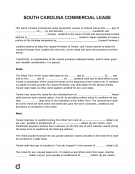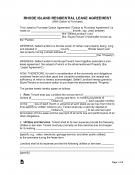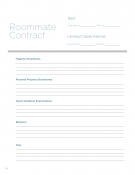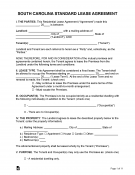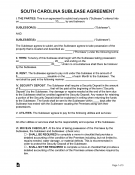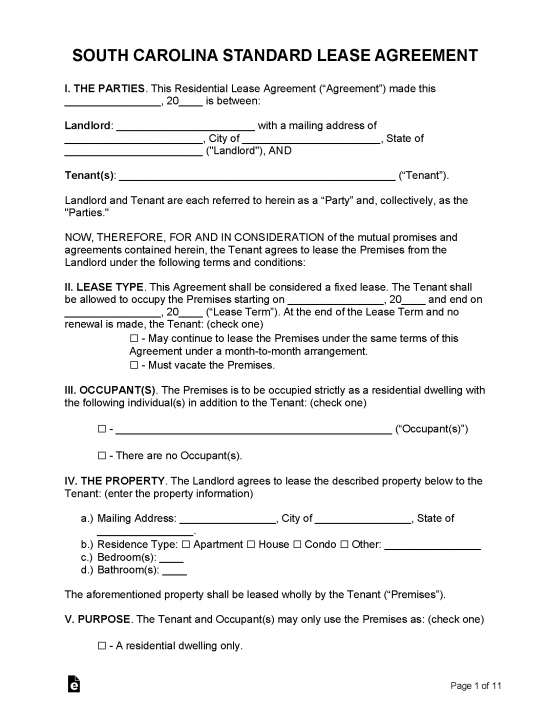South Carolina lease agreements bind landlords and tenants to the terms of a tenancy. Both parties will sign a written agreement that will cover the monthly rent, utility payments, and determine property policies, such as whether pets are permitted. The landlord and the tenant should both keep a copy of the lease agreement, and use it as their first resource to resolve questions about their rights and responsibilities under the lease.
Contents
By Type (6)
- Commercial Lease Agreement
- Month-to-Month Lease Agreement
- Rent-to-Own Lease Agreement
- Roommate Lease Agreement
- Standard Lease Agreement
- Sublease Agreement
Download: Adobe PDF, MS Word, Rich Text Format
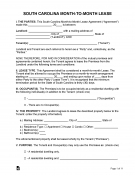 Month-to-Month Lease Agreement
Month-to-Month Lease Agreement
Download: Adobe PDF, MS Word, Rich Text Format
Download: Adobe PDF, MS Word, Rich Text Format
Download: Adobe PDF, MS Word, Rich Text Format
Download: Adobe PDF, MS Word, Rich Text Format
Download: Adobe PDF, MS Word, Rich Text Format
Landlord-Tenant Laws
Statutes – Title 27, Chapter 40 (Residential Landlord and Tenant Act)
Required Disclosures (3)
Agent/Landlord Information – Either in the text of the lease agreement or in another writing, landlords must disclose, prior to or at the beginning of a tenancy, the names and contact information for the people who will be permitted to come on to the property and who will be able to receive notices and tenant concerns. (§ 27-40-420)
Lead-Based Paint Disclosure – Federal law requires that landlords disclose the dangers associated with lead-based paints when leasing properties with dwelling units constructed prior to 1978.
Unequal Deposits – If a landlord rents out more than four (4) adjoining dwelling units on the premises but does not assess or calculate the security deposit in the same manner for all of them, then the landlord must either post the rules for calculating a deposit amount in a conspicuous place or provide the tenant with a written explanation. (§ 27-40-410)
Security Deposit Laws
Maximum Amount ($)
There is no statutory limit to what landlords may charge tenants as a security deposit.
Returning to Tenant
When a tenancy terminates, a landlord must return the security deposit to the tenant within thirty (30) days. The landlord may retain all or a portion of the deposit in order to remedy a tenant’s failure to meet his or her obligations under the lease agreement or those described in § 27-40-510.
If the landlord does retain a portion of the security deposit, the amount must be explained in writing within thirty (30) days of the end of the termination of the lease, with an itemization of all costs and deductions, provided to the tenant along with any remaining funds from the deposit. If a landlord fails to timely provide the funds or written itemization, the tenant is entitled to three times the amount wrongfully withheld, unless the reason for the delay is that the tenant failed to provide a new address after the completion of the tenancy. In that case, the tenant is still entitled to the appropriate share of the deposit. (§ 27-40-410)
When is Rent Due? (grace period)
Rent is due on the date named in the rental agreement. There is no statutorily required grace period.
Eviction Notice (non-payment)
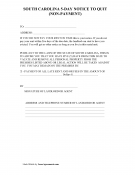 5-Day Notice to Pay or Quit – If a tenant does not pay rent on the day it is due, then the landlord or an agent may provide the tenant with this notice, informing the tenant that, if all rent is not paid within five (5) days of delivering the notice, then the landlord may terminate the lease and begin eviction proceedings. (§ 27-40-710)
5-Day Notice to Pay or Quit – If a tenant does not pay rent on the day it is due, then the landlord or an agent may provide the tenant with this notice, informing the tenant that, if all rent is not paid within five (5) days of delivering the notice, then the landlord may terminate the lease and begin eviction proceedings. (§ 27-40-710)
Download: Adobe PDF
Maximum Fees ($)
Late Rent Penalties
South Carolina law does not address the maximum amount that a landlord may charge a tenant for providing late rent. The best practice is to name the fee in the lease agreement and for the fee to be reasonable.
NSF Checks
South Carolina law allows parties that receive certain kinds of “bad checks,” including those written with insufficient funds to collect the amount owed plus a fee of $30 (§ 34-11-70).
However, it only applies to checks written that are deliberately written with insufficient funds, and it’s not clear whether the law applies to the landlord-tenant context at all. As a result, if a landlord wishes to charge a fee for providing an NSF rent check, the fee should be named in the lease agreement and reflect the actual costs the landlord faces for receiving a bounced check.
Tenant’s Unclaimed Property
After the conclusion of a lease agreement, or if a landlord reasonably believes that a property has been abandoned, and the tenant has either voluntarily ended utility service or removed most of his or her personal property from the dwelling unit, the landlord may enter the dwelling unit and dispose of personal property left behind if the property has an estimated market value of less than $500. For property that remains but appears to be worth more than $500, the landlord is liable for damage resulting from acts of gross negligence.
In instances of abandonment or in which a lease agreement has concluded, but the utilities remain connected or substantial personal property remains, the landlord must go to court and seek a writ of ejectment in order to enter and remove the property. (§ 27-40-730)
